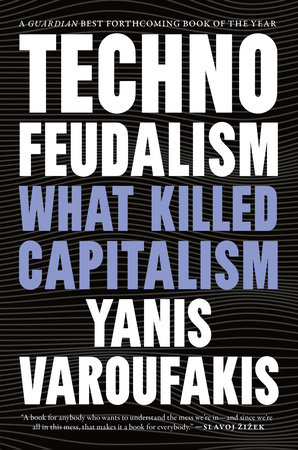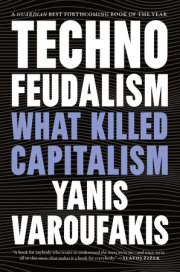Some years ago, I decided to write a brief history of capitalism. To temper the task’s enormity, and force myself to focus on what capitalism boils down to, I decided to pretend I was narrating capitalism’s story to my then twelve-year-old daughter. So, without seeking Xenia’s permission (something she will never let me forget!), I began writing the book in the form of a long letter to her. Taking care to use no jargon (not even the word capitalism!), I kept reminding myself that whether or not my narrative made sense to a youngster was a litmus test of my own grasp of capitalism’s essence. The result was a slim volume entitled
Talking to My Daughter: A Brief History of Capitalism. It took as its starting point an apparently simple question of hers: why is there so much inequality?
Even before it was published in 2017, I was feeling uneasy. Between finishing the manuscript and holding the published book in my hands, it felt as if it were the 1840s and I was about to publish a book on feudalism; or, even worse, like waiting for a book on Soviet central planning to see the light of day in late 1989. Belatedly, that is.
In the years after it was published, first in Greek, later in English, my weird hypothesis that capitalism was on the way out (and not merely undergoing one of its many impressive metamorphoses) gathered strength. During the pandemic, it became a conviction, which became an urge to explain my thinking in a book if for no other reason than to give friends and foes outraged by my theory a chance to disparage it properly having perused it in full.
So, what is my hypothesis? It is that capitalism is now dead, in the sense that its dynamics no longer govern our economies. In that role it has been replaced by something fundamentally different, which I call technofeudalism. At the heart of my thesis is an irony that may sound confusing at first but which I hope to show makes perfect sense: the thing that has killed capitalism is . . . capital itself. Not capital as we have known it since the dawn of the industrial era, but a new form of capital, a mutation of it that has arisen in the last two decades, so much more powerful than its predecessor that like a stupid, overzealous virus it has killed off its host. What caused this to happen? Two main developments: the privatisation of the internet by America’s and China’s Big Tech. And the manner in which Western governments and central banks responded to the 2008 great financial crisis.
Before saying a little more on this, I must emphasise that this is not a book about what technology
will do to us. It is not about AI-chatbots that will take over our jobs, autonomous robots that will threaten our lives, or Mark Zuckerberg’s ill-conceived metaverse. No, this book is about what has
already been done to capitalism, and therefore to us, by the screen-based, cloud-linked devices we all use, our boring laptop and our smartphone, in conjunction with the way central banks and governments have been acting since 2008. The historic mutation of capital that I am highlighting has already happened but, caught up in our pressing dramas, from debt worries and a pandemic to wars and the climate emergency, we have barely noticed. It is high time we paid attention!
If we do pay attention, it is not hard to see that capital’s mutation into what I call
cloud capital has demolished capitalism’s two pillars: markets and profits. Of course, markets and profits remain ubiquitous – indeed, markets and profits were ubiquitous under feudalism too – they just aren’t running the show any more. What has happened over the last two decades is that profit and markets have been evicted from the epicentre of our economic and social system, pushed out to its margins, and replaced. With what? Markets, the medium of capitalism, have been replaced by digital trading platforms which look like, but are not, markets, and are better understood as fiefdoms. And profit, the engine of capitalism, has been replaced with its feudal predecessor: rent. Specifically, it is a form of rent that must be paid for access to those platforms and to the cloud more broadly. I call it
cloud rent.
As a result, real power today resides not with the owners of traditional capital, such as machinery, buildings, railway and phone networks, industrial robots. They continue to extract profits from workers, from waged labour, but they are not in charge as they once were. As we shall see, they have become vassals in relation to a new class of feudal overlord, the owners of cloud capital. As for the rest of us, we have returned to our former status as serfs, contributing to the wealth and power of the new ruling class with our unpaid labour – in addition to the waged labour we perform, when we get the chance.
Does all this matter to the way we live and experience our lives? It certainly does. As I’ll show in Chapters 5, 6 and 7, recognising that our world has become technofeudal helps us dissolve puzzles great and small: from the elusive green energy revolution and Elon Musk’s decision to buy Twitter to the New Cold War between the USA and China and how the war in Ukraine is threatening the dollar’s reign; from the death of the liberal individual and the impossibility of social democracy to the false promise of crypto and the burning question of how we may recover our autonomy, perhaps our freedom too.
By late 2021, armed with these convictions, and egged on by a pandemic that strengthened them, the die had been cast: I would sit down and write a brief introduction to technofeudalism – the far, far uglier social reality that has superseded capitalism. One question remained: whom to address it to? Without much thought, I decided to address it to the person who had introduced me to capitalism at a ridiculously young age – and who, like his grand- daughter, once asked me an apparently simple question that shapes almost every page of this book. My father.
For the impatient reader, a word of warning: my description of technofeudalism does not come until Chapter 3. And for my description to make sense, I need first to recount capitalism’s astounding metamorphoses over the preceding decades: this is Chapter 2. The beginning of the book, meanwhile, is not about technofeudalism at all. Chapter 1 tells the story of how my father, with the help of some metal fragments and Hesiod’s poetry, introduced my six-year-old self to technology’s chequered relationship with humanity and, ultimately, to capitalism’s essence. It presents the guiding principles on which all of the thinking that follows is based, and it concludes with that seemingly simple question Father put to me in 1993. The rest of the book takes the form of a letter addressed to him. It is my attempt to answer his killer question.
Copyright © 2024 by Yanis Varoufakis. All rights reserved. No part of this excerpt may be reproduced or reprinted without permission in writing from the publisher.







